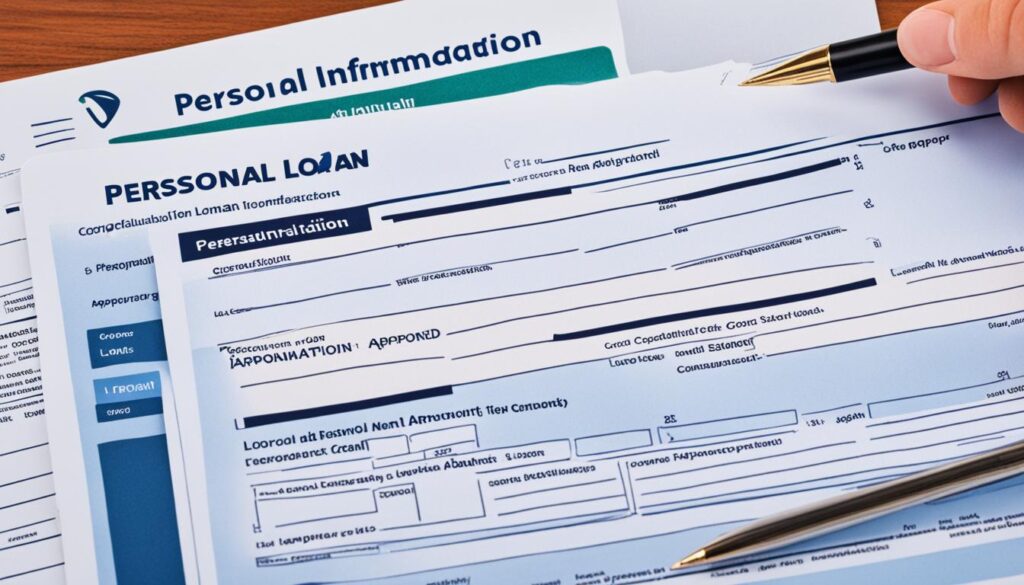Get A Loan : When it comes to financing your goals or handling unexpected expenses, a personal loan can provide the financial support you need. But how exactly can you secure a loan? In this article, we’ll explore the key factors lenders consider and steps you can take to increase your chances of loan approval.
One crucial element that lenders evaluate is your credit score. Your credit history plays a vital role in determining your creditworthiness and can impact the loan amount, interest rate, and loan term you’re eligible for. To check your credit score, you can request your credit report from Equifax, Experian, and TransUnion – the top three credit reporting agencies. Reviewing your report for accuracy and taking steps to improve your credit if necessary is essential.
Understanding the significance of your credit score is crucial. It affects the interest rate you’ll be offered along with the loan terms. A higher credit score increases your chances of securing more favorable loan terms, while a lower credit score may limit your borrowing options and result in higher interest rates.
In addition to your credit score, lenders also assess your capacity to repay the loan by evaluating your debt-to-income (DTI) ratio. This ratio compares your monthly income to your financial obligations and gives lenders insight into your ability to manage new debt. A lower DTI ratio demonstrates a higher likelihood of loan repayment and can improve your chances of loan approval.
Collateral and capital can also play a significant role in loan approval. Collateral, such as personal assets, can secure the loan and offer access to lower interest rates and better loan terms. On the other hand, capital represents the assets you have that could be used to repay the loan in case of a financial setback, and more capital can enhance your borrowing options.
Finally, lenders evaluate the conditions surrounding your loan application, considering factors such as the loan purpose, market conditions, and specific loan restrictions. Understanding these conditions can help you determine if you’re eligible for a loan and whether it aligns with your financial goals.
Key Takeaways: Get A Loan
- Your credit score plays a crucial role in loan approval and determines the loan terms you’re offered.
- Review your credit report for accuracy and take steps to improve your credit if necessary.
- A low debt-to-income (DTI) ratio can increase your chances of loan approval.
- Collateral and capital can influence the loan terms and borrowing options available to you.
- Understanding the conditions set by lenders can help you determine if you’re eligible for a loan.
Why Credit Score Matters for Getting a Loan
Your credit score plays a significant role in your ability to obtain a loan. Lenders rely on your credit score to determine your creditworthiness and assess the risk of lending to you. Understanding why your credit score matters can help you make informed decisions when applying for a loan.
Interest Rate: One of the key factors affected by your credit score is the interest rate you’ll be offered. Lenders use your credit score to gauge the likelihood of you repaying the loan on time. A higher credit score indicates a lower risk of default, which typically translates to a lower interest rate. Conversely, a lower credit score may result in higher interest rates, making borrowing more expensive.
Loan Term: Your credit score can also impact the length of your loan term. Lenders may offer more favorable terms, such as longer repayment periods, to borrowers with higher credit scores. This allows you to spread out the payments over a longer period, potentially making the loan more affordable and manageable.
Credit Limit: When applying for certain types of loans, such as credit cards or lines of credit, your credit score can influence the credit limit you’re approved for. A higher credit score may qualify you for a higher credit limit, giving you greater financial flexibility. On the other hand, a lower credit score may result in a lower credit limit, potentially limiting your borrowing power.
APR (Annual Percentage Rate): The APR is another important factor impacted by your credit score. The APR represents the total cost of borrowing, including interest and any additional fees. Lenders often offer more favorable APRs to borrowers with higher credit scores, as they are seen as less risky. Conversely, lower credit scores may lead to higher APRs, increasing the overall cost of the loan.
It’s crucial to understand the significance of your credit score when it comes to obtaining a loan. A higher credit score can open doors to better loan terms, including lower interest rates, longer repayment periods, and higher credit limits. On the other hand, a lower credit score may limit your options and result in less favorable loan terms. By staying informed and taking steps to improve your credit score, you can increase your chances of getting approved for a loan on favorable terms.
“A higher credit score generally results in better loan terms, such as lower interest rates and longer repayment periods.”
Understanding Debt-to-Income Ratio

Capacity, or your debt-to-income (DTI) ratio, is an important factor in loan approval. Lenders evaluate your ability to repay a loan by comparing your monthly income to your financial obligations. A low DTI ratio indicates that you have enough income to meet your current obligations and take on new debt. Lenders prefer borrowers with a lower DTI ratio as it shows a higher likelihood of loan repayment.
To calculate your DTI ratio, divide your total monthly debt payments by your gross monthly income. A lower DTI ratio can increase your chances of getting approved for a loan.
Understanding DTI Ratio Calculation
DTI Ratio = (Total Monthly Debt Payments / Gross Monthly Income) x 100
For example, if your monthly debt payments amount to $1,500 and your gross monthly income is $5,000, your DTI ratio would be:
($1,500 / $5,000) x 100 = 30%
This means that 30% of your monthly income goes towards debt payments.
Impact of DTI Ratio on Loan Approval
A lower DTI ratio indicates a healthier financial situation, showcasing your ability to manage your financial obligations. Lenders typically have maximum DTI ratio requirements, and borrowers with a lower DTI ratio have a higher chance of getting approved for a loan. It demonstrates your capacity to handle the additional debt responsibly.
To improve your DTI ratio and increase your chances of loan approval, you can:
- Pay off existing debts
- Increase your monthly income
- Reduce your financial obligations
By taking these measures, you can enhance your capacity to repay a loan and strengthen your overall financial profile.
Having a clear understanding of your debt-to-income ratio is crucial when applying for a loan. It not only helps you assess your own financial situation but also allows lenders to evaluate your capacity to manage additional debt responsibly.
The Importance of Collateral for Loan Approval

Collateral plays a crucial role in the loan approval process. It refers to an asset that you own, such as a car or home, that you can use to secure a loan. Lenders often require collateral as it offsets the risk they take when offering credit. By using collateral, borrowers can access borrowing options with lower interest rates and better loan terms.
When you provide collateral, it gives lenders confidence that they have a personal asset to fall back on if you default on the loan. This reduces their risk and allows them to offer more favorable terms. For example, if you’re looking to purchase a house and use the property as collateral, lenders may be more willing to offer a larger loan amount at a lower interest rate.
However, it’s important to note that if you fail to repay the loan, the lender has the right to repossess the collateral. This means that you could potentially lose your personal asset, such as your car or home.
“Using collateral can give borrowers access to lower interest rates and better loan terms.”
Collateral is particularly important for larger loans or loans with higher interest rates. By offering an asset of value, borrowers can decrease the risk for lenders and increase their chances of loan approval. It’s essential to carefully consider the value and implications of your collateral when applying for a loan.
Benefits of Collateral:
- Lower interest rates
- Better loan terms
- Increased borrowing options
Collateral provides lenders with a safety net, allowing them to offer loans at more affordable rates. However, it’s crucial to understand the potential consequences of defaulting on the loan, as the lender may repossess the collateral.
Now that we’ve explored the importance of collateral for loan approval, let’s move on to understanding another critical factor: capital.
The Role of Capital in Loan Approval

When applying for a loan, lenders consider various factors to assess your creditworthiness and determine your eligibility. One crucial aspect that lenders evaluate is your capital. Capital represents the assets you have that could be used to repay a loan in the event of a financial setback.
Your capital serves as an indicator of your financial security and ability to repay the loan. The more capital you have, the more confident lenders may be in extending credit to you. Examples of capital include:
- Savings
- Investments
- Retirement accounts
- The down payment on a home
These assets demonstrate your financial stability and show lenders that you have a backup plan in case of unexpected financial difficulties. Having sufficient capital can enhance your borrowing options and potentially lead to better loan terms, including lower interest rates and more favorable repayment terms.
For lenders, capital acts as a form of security, reducing the risk they take when offering credit. In the event that you encounter financial challenges, your capital can be utilized to repay the loan, minimizing the lender’s potential losses.
It’s important to note that while capital plays a significant role in loan approval, it is not the sole determining factor. Lenders often consider other aspects such as your credit score, income, and debt-to-income ratio. By focusing on building and maintaining your capital, you can strengthen your financial position and improve your chances of obtaining loan approval with favorable terms.
Comparison of Capital Impact on Loan Approval
| Capital | Influence on Loan Approval |
|---|---|
| Higher capital | Increased confidence from lenders |
| Lower capital | Potential limitations on borrowing options |
| Sufficient capital | Potential for better loan terms |
By understanding the role of capital and its impact on loan approval, you can work towards strengthening your financial position and securing favorable loan terms for your borrowing needs.
Conditions and Loan Approval

When applying for a loan, there are several conditions that lenders consider before extending credit. These conditions play a crucial role in determining the loan approval process and the terms under which the loan is offered. Understanding these conditions can help you navigate the lending landscape and increase your chances of getting approved for the loan you need.
One of the main factors that lenders assess is the loan purpose. The loan purpose refers to the reason why you are seeking a loan, such as funding a home improvement project, consolidating debt, or covering medical expenses. Different loan purposes may come with specific loan amounts, interest rates, and repayment terms. For example, a loan for purchasing a car may have different conditions than a loan for financing a vacation. It’s important to consider the loan purpose and ensure that it aligns with your financial goals.
Another crucial condition that lenders evaluate is the loan amount. The loan amount refers to the total sum of money you are requesting to borrow. Lenders assess the loan amount based on various factors, including your creditworthiness, income, and the purpose of the loan. Depending on the lender’s criteria, they may have minimum and maximum loan amount limits. It’s essential to carefully determine the loan amount you need and ensure it fits within the lender’s conditions.
Interest rate is another critical condition that lenders consider when approving a loan. The interest rate represents the cost of borrowing and is typically expressed as a percentage. Lenders evaluate several factors, including your credit score, income, and the loan amount, to determine the interest rate you are offered. A higher credit score and a lower loan amount often result in more favorable interest rates, while a lower credit score may lead to higher interest rates. Understanding how the interest rate is determined can help you make informed decisions about borrowing.
Loan restrictions are also an important set of conditions that lenders impose. These restrictions can vary depending on the lender and the type of loan you are applying for. Common loan restrictions include limitations on how the funds can be used, requirements for a specific credit score or income level, and restrictions on collateral. It’s crucial to carefully review the loan restrictions to ensure that you meet all the criteria set by the lender.
To summarize, the conditions set by lenders play a significant role in loan approval. These conditions encompass the loan purpose, loan amount, interest rate, and any restrictions imposed by the lender. By understanding and meeting these conditions, you can increase your chances of getting approved for the loan you need and navigate the borrowing process more effectively.
| Conditions | Loan Purpose | Loan Amount | Interest Rate | Loan Restrictions |
|---|---|---|---|---|
| Definition | The reason for seeking a loan | The total sum of money requested | The cost of borrowing expressed as a percentage | Limitations or criteria set by the lender |
| Impact | Determines specific loan terms and conditions | Affects affordability and repayment capacity | Determines the cost of borrowing | May impose requirements or limitations |
| Considerations | Align with financial goals | Ensure affordability and suitability | Understand the impact on total repayment | Review and meet all lender criteria |
Steps to Get a Personal Loan

With the right approach, getting a personal loan can be a straightforward process. Follow these steps to secure the funds you need:
- Check your credit score and take steps to improve it if necessary. Your credit score plays a significant role in the loan approval process. Lenders use it to assess your creditworthiness and determine the terms and conditions of your loan. Before applying for a personal loan, check your credit score and address any issues that may be affecting it. You can improve your credit score by making timely payments, reducing your debt, and maintaining low credit card balances.
- Calculate the loan amount you need and estimate the monthly payments using a personal loan calculator. Determine how much money you require and assess your current financial situation to ensure you can comfortably repay the loan. Use a personal loan calculator to estimate the monthly payments, taking into account factors such as the loan amount, interest rate, and loan term. This will help you budget accordingly and ensure that the loan is affordable for you.
- Get prequalified with multiple lenders to compare loan offers and terms. Being prequalified gives you an idea of the loan amount and interest rate you may be eligible for. Reach out to different lenders and provide them with the necessary information to receive prequalification offers. By comparing the offers, you can find the best terms and rates that suit your financial needs.
- Consider factors like interest rates, fees, and loan restrictions when comparing lenders. Look beyond the interest rate when evaluating loan offers. Consider any origination fees, prepayment penalties, and other charges that may be associated with the loan. Additionally, pay attention to any restrictions or requirements that may limit your borrowing options.
- Choose a lender and complete the loan application. Once you’ve evaluated different offers, select the lender that best meets your requirements. Complete the loan application accurately and provide all necessary documentation as requested by the lender. Be prepared to provide information about your income, employment, and financial history to facilitate the application process.
- Review the loan offer and its terms and conditions. After submitting your loan application, the lender will provide a loan offer with specific terms and conditions. Carefully review the offer and ensure that you understand all aspects of the agreement. Pay attention to the interest rate, loan term, repayment schedule, and any applicable fees or penalties.
- Accept the loan by signing the loan agreement. If you are satisfied with the loan offer and its terms, proceed to accept the loan by signing the loan agreement. By signing, you acknowledge your commitment to repay the loan according to the agreed-upon terms and conditions.
- Receive the loan funds, usually deposited into your bank account. Once the loan agreement is signed, the lender will initiate the disbursement of the loan funds. In most cases, the funds are directly deposited into your bank account, providing you with quick access to the money you need.
| Step | Description |
|---|---|
| 1 | Check your credit score and take steps to improve it if necessary |
| 2 | Calculate the loan amount you need and estimate the monthly payments using a personal loan calculator |
| 3 | Get prequalified with multiple lenders to compare loan offers and terms |
| 4 | Consider factors like interest rates, fees, and loan restrictions when comparing lenders |
| 5 | Choose a lender and complete the loan application |
| 6 | Review the loan offer and its terms and conditions |
| 7 | Accept the loan by signing the loan agreement |
| 8 | Receive the loan funds, usually deposited into your bank account |
By following these steps, you can navigate the personal loan process with confidence and secure the funds you need.
Importance of Your Credit Score for Getting a Loan

Your credit score plays a crucial role in loan approval. Lenders use your credit score to assess your creditworthiness and determine the risk of lending to you. A higher credit score increases your chances of loan approval and may result in more favorable terms.
A good credit score is achieved by maintaining a positive payment history, having a diverse credit mix, and keeping your credit utilization low. Let’s explore each of these factors:
1. Payment History
Your payment history shows how responsible you are with managing credit. It includes information about whether you’ve made payments on time, missed any payments, or defaulted on loans.
“Payment history is an essential indicator of your ability to repay debts. Lenders want to see consistent, timely payments to give them confidence in your creditworthiness.”
To maintain a positive payment history:
- Pay your bills on time
- Make at least the minimum payment required
- Avoid late payments and defaults
2. Credit Mix
Your credit mix refers to the various types of credit you have, such as credit cards, loans, and mortgages. Having a diverse credit mix demonstrates that you can manage different forms of credit responsibly.
Lenders prefer borrowers with a healthy mix of credit, including revolving credit (e.g., credit cards) and installment loans (e.g., car loans), as it indicates a well-rounded credit management approach.
3. Credit Utilization
Credit utilization is the amount of credit you’re currently using compared to your total available credit. It’s calculated by dividing your credit card balances by your credit limits.
A low credit utilization ratio shows that you’re not relying heavily on credit and can manage your debts effectively.
“Aim to keep your credit utilization below 30% to demonstrate responsible credit management and maintain a good credit score.”
You can lower your credit utilization by:
- Paying down your credit card balances
- Requesting a credit limit increase
- Avoiding unnecessary credit card spending
By focusing on these factors, you can improve your credit score over time and increase your chances of loan approval.
| Credit Score | Loan Approval | Interest Rate | Loan Terms |
|---|---|---|---|
| Excellent (750+) | High | Low | Favorable |
| Good (700-749) | Good | Moderate | Favorable |
| Fair (650-699) | Fair | Higher | Standard |
| Poor ( | Challenging | Higher | Stricter |
Easily apply for the best personal loan online in 3 steps with online lenders offering a range of loan options tailored to your needs. Apply online to check your credit and qualify for personalized loan options, with loan amounts ranging from small to large personal loans. Discover personal loans typically range from next business day loan funding to fixed-rate loans with terms for an unsecured personal loan.
Compare the best personal loan rates and easily apply for a personal loan to consolidate debt or take out a personal loan for any loan purpose. SoFi rate ranges are current, and with a hard credit pull, you can get the money you need quickly. Use a personal loan calculator to estimate the total cost of your loan and see if a personal loan may be right for you. Refinance a personal loan or pay off your loan early with online personal loan lenders offering competitive rates and flexible terms throughout the life of the loan.
Upgrade personal loan offers may also be provided in your loan application, ensuring you get the funds you need with the lowest personal loan costs. Whether you’re eligible for a loan or not, personal loans online provide convenient options to get the funds you need, offering a fixed rate and the opportunity to compare the best personal loan offers available.
Also Read : What Types Of Documentation Are Required For Income BasedLoan Applications?
Conclusion
In conclusion, obtaining a personal loan requires careful consideration and preparation. Your credit score is a crucial factor in the loan approval process, impacting both the interest rates and loan terms you can secure. It is essential to understand how lenders evaluate creditworthiness and the factors that can affect your credit score.
By following the steps outlined in this article, you can navigate the personal loan application process more effectively. Start by checking your credit score and taking steps to improve it if necessary. Calculate your loan needs and use a loan calculator to estimate monthly payments. Compare multiple lenders to find the best loan offer and terms for your financial situation.
Remember that responsible borrowing is key to managing personal loans effectively. Make informed decisions about borrowing based on your individual needs and financial goals. Consider the impact of loan terms and interest rates on your monthly budget and long-term financial stability.
With proper planning and attention to your credit score and loan terms, you can confidently apply for a personal loan and secure the funds you need while minimizing potential financial risks. By understanding the loan approval process, you increase your chances of getting approved and achieving your financial objectives.
FAQs
Q: How do I check my rate for a personal loan?
A: You can easily check your rate for a personal loan by visiting the lender’s website and filling out a simple online form. This process usually involves providing some basic information to receive personalized loan options.
Q: How can I apply for a personal loan online in 3 steps?
A: To apply for a personal loan online in 3 steps, you typically need to select the loan amount, provide your personal and financial information, review and submit your application. Some lenders offer a streamlined online application process for quick approval.
Q: What is APR and why is it important when getting a personal loan?
A: APR stands for Annual Percentage Rate, which includes the interest rate and any additional fees charged by the lender. It is important when getting a personal loan because it helps you understand the total cost of borrowing money and allows you to compare offers from different lenders.
Q: Can I use a personal loan to consolidate debt?
A: Yes, you can use a personal loan to consolidate high-interest debt from credit cards or other loans into one loan with a potentially lower interest rate. Debt consolidation with a personal loan may help you save money on interest and simplify your monthly payments.
Q: How quickly can I get the money I need with a personal loan?
A: Depending on the lender, you may receive the funds from a personal loan as soon as the next business day after approval. Online lenders typically offer quick disbursal of funds once your loan application is approved.
Q: What factors determine if a personal loan may be right for me?
A: Factors such as your credit score, financial goals, loan amount needed, repayment terms, and the interest rate offered by the lender can help determine if a personal loan is a suitable option for your financial needs.
Q: How do I calculate my monthly payment for a personal loan?
A: You can use a personal loan calculator available on most lender websites to estimate your monthly payment based on the loan amount, interest rate, and repayment term. This tool can help you plan your budget accordingly.
Source Links
- https://www.wellsfargo.com/goals-credit/smarter-credit/credit-101/getting-a-loan/
- https://www.experian.com/blogs/ask-experian/personal-loans-what-to-know-before-you-apply/
- https://www.nerdwallet.com/article/loans/personal-loans/how-to-get-a-personal-loan